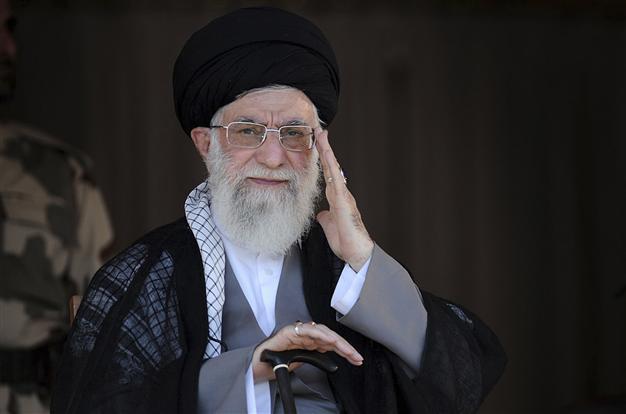Iran will not ship out enriched uranium: negotiator
TEHRAN - WASHINGTON

In this picture released by an official website of the office of the Iranian supreme leader, Supreme Leader Ayatollah Ali Khamenei, center, attends a graduation ceremony of army cadets, in Tehran, Iran, Saturday, Oct. 5 2013. AP photo
Iran will not agree to ship out its stockpile of enriched uranium, one of its main negotiators said Sunday ahead of crunch talks with world powers on its nuclear programme.
"We will negotiate about the volume, levels and the methods of enrichment but shipping out the (enriched) material is a red line for Iran," deputy foreign minister Abbas Araqchi told the state broadcaster.
The remarks came on the eve of two-day talks in Geneva, the first meeting between Iranian negotiators and world powers since President Hassan Rouhani, a reputed moderate, took office in August.
The red line adds to Tehran's insistence on what it considers its "right" to operate a uranium enrichment programme on its soil -- which could provide fuel for both civilian and military objectives.
Iran currently has a stockpile of 6,774 kilogrammes of low-level uranium enriched, and nearly 186 kg of medium-enriched material with 20 percent purity, according to latest figures by the UN nuclear watchdog in September.
It also possesses some 187 kg of the 20 percent material converted to uranium oxide for use in fuel plates.
"The Iranian negotiating team will present a specific plan ... which we hope will produce results in a logical time period," Araqchi said.
Foreign Minister Mohammad Javad Zarif is Iran's top negotiator with the so-called P5+1 group of the United States, Britain, China, France and Russia plus Germany.
But Araqchi said he will lead the Iranian team in the talks with European Union foreign policy chief Catherine Ashton and representatives from the P5+1 countries as Zarif will only attend the opening meeting.
He said Iran would "remove all of (the) rational concerns of the other side," referring to suspicions in the West and Israel that Tehran is pursuing nuclear arms under the guise of a civilian energy programme, a claim the Islamic state vehemently denies.
US delegation to Iran talks includes sanctions expertThe U.S. delegation to next week's talks about Iran's nuclear program includes one of the U.S. government's leading sanctions experts, a hint that Washington may be giving greater thought to how it might ease sanctions on Tehran.
Undersecretary of State Wendy Sherman, effectively the State Department's third-ranking diplomat, will lead the U.S. delegation to negotiations between Iran and six major powers in Geneva on Tuesday and Wednesday, the State Department said.
The central issue at the talks, which will involve Britain, China, France, Germany, Russia, the United States and Iran, will be to explore what, if any, steps Iran might take to curb its nuclear program and what, if any, sanctions relief the major powers may offer in return.
Western powers are concerned that Iran is seeking to develop atomic bombs. Iran denies that, saying its nuclear program is solely for peaceful purposes.
The U.S. delegation will include Adam Szubin, the director of the Treasury Department's Office of Foreign Assets Control, or OFAC, and among the U.S. government's foremost experts on sanctions.
Szubin has led OFAC since 2006 and is responsible for administering and enforcing the U.S. government's economic sanctions programs to advance foreign policy and national security objectives.
The U.S. team also includes James Timbie, senior adviser to the undersecretary of state for arms control and international security; Puneet Talwar, senior director for Iran, Iraq and the Gulf States on the White House National Security Staff; and Richard Nephew, principal deputy coordinator for sanctions policy at the State Department, a U.S. official said.
